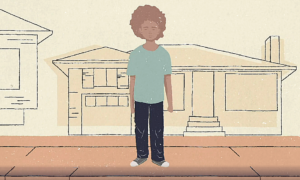 It has been said that what does not break you will make you stronger. Spirituality appears to be the mechanism connected to this idea. This idea has also been shown to be prevalent in youth in foster care.
It has been said that what does not break you will make you stronger. Spirituality appears to be the mechanism connected to this idea. This idea has also been shown to be prevalent in youth in foster care.
There was a time when the terms religion and spirituality were used interchangeably: one’s belief systems, identifying with a higher power, development of a sense of purpose, moral responsibility, intimate relationships and love and value of oneself.
But now religion is seen more as a formal doctrine whereas spirituality is seen as more individual, subjective and freeing expression.
There is evidence that religion and spirituality are important factors among the majority of American teenagers, with 95 percent between 13 and 17 believing in God. One study found that 50 percent between the ages of 13 and 18 participate in a religious youth group, 38 percent attend church weekly and 16 percent attend at least twice a week. Spirituality did not prevent trauma but was used as a coping strategy, the study found.
Growing up in foster care can be unpleasant for some and pleasant for others. Though it should be obvious that how a child experiences foster care depends not only on the caregiver but the child, it appears that perhaps more attention should be geared toward the effects of spirituality on this population. Could it be that spirituality is linked to resilience?
When a child is placed in foster care, feelings expressed include fear, anxiety, denial and sadness. To be displaced can be a very devastating experience, whether it is due to a catastrophic event due to Mother Nature or a parent dying unexpectedly.
What I have discovered is that this lack of control over one’s circumstances may be the heart of spiritual crisis. When I asked a foster care alumnus was there something in particular that he attributed to his successful transition from foster care, his response was spirituality. He described that knowing that there was something bigger than him in charge was a sigh of relief. It may be valuable to be connected to something greater, and perhaps this may give you a sense of purpose.
When a child is placed in foster care, it is unfortunate that their relationships with social networks such as religious affiliation are not always maintained. There are times where the foster parents may have different religious values or affiliations. It is for this reason that social workers need to be in tune with not only the physical needs of children in their caseload but emotional and social needs as well. It is important to recognize that social supports within church groups can be a powerful tool that increases success for this population.
It is imperative that social workers recognize the need to be culturally sensitive and have an understanding of religious teachings and values in order to know how to ask the appropriate questions. When planning and setting goals, they need to be aware of the different roles of religion and different belief systems in an effort to be sensitive to religious values. Having an understanding of basic practices can make a difference in terms of success. Whether the goal is family reunification or adoption, understanding the role of spirituality and religion can be a vital part in the process.
With the current atmosphere of society today, there always seems to be concern about addressing religious issues due to separation of church and state as well as ensuring rights are not being violated. However, for the population of children and youth in foster care, it would seem that belief in a higher power may provide hope that their seemingly chaotic life will soon stabilize. There have been studies that indicate a relationship between positive religion and spirituality and positive outcomes among adolescents. There is also evidence that religion may act as a mediator that buffers them for negativity and is a source of resiliency, particular for those adolescent exposed to poor neighbors and violence.
It can be very difficult to understand one’s purpose when your life seems to be out of control. What I have found is that children would rather stay in their chaotic and somewhat unsafe home than move to an unfamiliar place where it is much safer. With this in mind, those who are involved with this population such as social workers, educators, counselors and psychologists, must look beyond their field of study to help them succeed.
When considering religion and spirituality when working with children and youth in foster care, there are several implications:
- Practitioners need to not only tolerate different religions and cultures, but they must recognize the value of different religions and cultures. The alternative produces negative consequences.
- It is important to value these young people’s religion because it helps them to continue to grow and develop spiritually. Doing this will provide them with something they can hold on to that will keep them safe and stable during this chaotic time in foster care. The hope is that they will find hope and motivation to keep moving forward.
- It is imperative that practitioners recognize that religious affiliation may provide children and youth in foster care social networks with peers and coping strategies. It may be the link that bridges their life before and after foster care, which may bring stability.
The concept of children being placed in foster care goes as far back as the Old Testament with the Scripture speaking of caring for the orphans and widows. However, it seems that the role of religion and spirituality has lost its place. Studies have shown that religion and spirituality have been linked to positive outcomes in youth’s mental health in terms of internalizing anxiety and depression, social adjustment and coping abilities. With this in mind, it is imperative that child welfare agencies as well as other agencies that work with this population reconsider the role that religion and spirituality may have in improving the lives of children and youth in foster care.
Wanda Davidson, Ph.D., previously held the position of assistant professor of social work at Tennessee State University. With more than 15 years of practice in child welfare, she is an advocate for youth aging out of foster care.






























